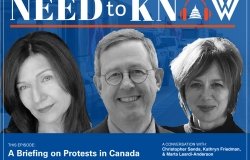Minority Group Leadership in Congress
Featuring:Walter E. Fauntroy, former Democratic Delegate from D.C. (invited); Robert A. Underwood, former Democratic Delegate from Guam; Carol M. Swain, professor of law and political science, Vanderbilt University; and Juan Williams, national correspondent, NPR, and Fox News.
Overview
Panelists: Walter E. Fautroy, former Delegate for the District of Columbia to the U.S. House of Representatives; Robert A. Underwood, former Delegate for Guam to the U.S. House of Representatives; Carol M. Swain, professor of political science and law, Vanderbilt University; Juan William, National Correspondent for NPR, and panelist on Fox News Sunday.
Carol Swain, author of Black Faces, Black Interests: The Representation of African Americans in U.S. Congress (1993), updated the findings of her earlier book with a paper prepared for the seminar titled, "The Congressional Black Caucus in the Republican Era." She concluded that even though blacks in Congress have increased their numbers in the House since 1992 from 25 to 37, the Congressional Black Caucus (CBC) is weaker now because it is a minority within a minority. Moreover, she concluded that for the long-term, African American numbers in Congress are "not likely to grow and there might even be some retrenchment" given changing demographics, especially growing Hispanic populations in once majority black districts. Swain said the challenge to the Black Caucus is to be flexible enough "to seize opportunities that arise in the Republican Congress" and not be tied to the racial politics or causes of the past.
Robert Underwood brought to the seminar the perspective of having been chairman of the Asian Pacific American Caucus in Congress and a member of the Hispanic Caucus during his service in Congress (1993-2003). He noted that while the CBC tended to focus on traditional civil rights issues, the Hispanic Caucus was more diverse in both its membership and issue concerns. While there has been some movement towards developing a common agenda between the three caucuses (CBC, Hispanic, and APA), nothing has come of it thus far. "Instead of developing a common agenda, Members are spread out everywhere in Congress with different committee assignments and interests, and no one has yet figured out how to use that." Whereas the CBC is more unified and more liberal, the Hispanic Caucus has no real national leaders or single rallying cause. At the same time, members of the Hispanic Caucus and Hispanic leaders across the nation have an easier time communicating with their community given the number of Hispanic broadcast stations and channels in major metropolitan areas. While the Hispanic Caucus is more diverse and less liberal, it is still very Democratic, he concluded.
Juan Williams, author of Thurgood Marshall: American Revolutionary (written while a guest scholar at the Wilson Center), and Eyes on the Prize: America's Civil Rights Years, 1954-65, observed how much the issues have changed in black communities since the civil rights era of the mid- to late 1960s. Whereas then the principal issues then were desegregation and busing, today they are the quality of schools, safety and crime, commercial development and government contracts. He used the case of nearby Prince George's County as an example, having transitioned from a predominantly white, rural country to one that is now predominantly black suburban with urban problems.
Walter Fauntroy argued that people define their lives now the same as they always have, and that is in terms of five principal goals: decent income, education, healthcare, housing and shelter from the elements, and justice. The purpose of government and politics is to determine who gets what, how, and why, and minorities have always gotten the least of the five life definers because they are not adequately represented or looked out for by government. Fauntroy says today's government is similar to that in 1981 when he was Black Caucus chairman in the House and presented an alternative budget. "Government is controlled by two groups," he observed, "the fiscal conservatives and the social conservatives. "The fiscal conservatives want to preserve their place in the financial order, while the social conservatives want to preserve the existing social order." The politics of 1981 and today are based on three faulty premises he said: (1) the poor have too much money; (2) the rich have too little money; and (3) all problems lend themselves to military solutions. "It was bad to ‘the least of these,' then, and it's bad for them now," he concluded.
Report by Don Wolfensberger, Director, The Congress Project
Thank you for your interest in this event. Please send any feedback or questions to our Events staff.










